Inside the Everyday Lives of Queer Couples Who Are Redefining What Love Looks Like
“It was hate at first sight,” Nick remembers.
That’s how it began — not with sparks or perfect timing, but with a rumour, a misunderstanding, and a fair amount of suspicion. For many queer couples in India, love doesn’t follow a neat storyline. It often begins in unexpected places, grows slowly, and takes shape in the gaps left by what society doesn’t always offer: acceptance, templates, clear directions.
In a world that still struggles to fully see them, queer couples build their relationships from the ground up — sometimes with uncertainty, sometimes with humour, always with intent. There is no rulebook, no fixed way to love. What forms between them is something they shape every day: through shared routines, honest conversations, and the decision to keep showing up for each other, even when it’s hard.
For Nick and Sayantika in Bengaluru, and Atulan and Divesh in Mumbai, love was never about fitting in. It was about finding something real and refusing to apologise for it. It was about choosing connection, even when the world around them gave them every reason to hide.
Team NiSa: A love story born of rumours
Nick, known more formally as Nikita Prakash, works as a senior brand marketing manager at Flipkart. She is also a drag artist. Sayantika Majumder, her partner of five years, is a senior copywriter in the same organisation. Together, they call themselves ‘Team NiSa’, a name that began as a playful shorthand but now represents the foundation of their partnership.
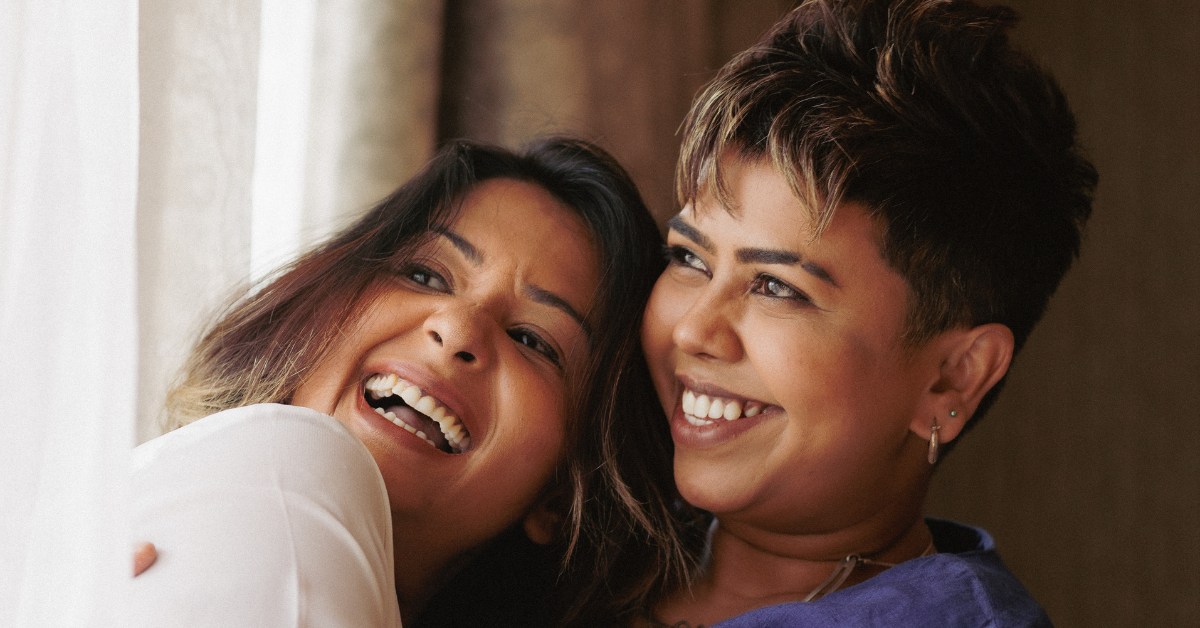 Nick and Sayantika call themselves ‘Team Nisa’ and battle through everything in life together
Nick and Sayantika call themselves ‘Team Nisa’ and battle through everything in life together
Their story began in conflict, with a rumour that brought them together before they had even met. At the time, Nick was in Mumbai, Sayantika in Bengaluru, and neither knew the other personally. But whispers in their community claimed they were dating, and both women, baffled and annoyed, assumed the other was behind it.
When they finally met, it was anything but pleasant. “It was hate at first sight,” Nick remembers. At a queer party where they first crossed paths, she ended up flirting with Sayantika’s friend, which only added to the tension. “I thought she was so full of herself,” Sayantika admits. “We barely spoke, and when we did, it was mostly awkward.”
For the next two years, they bumped into each other at events but never exchanged more than cold glances. “It was like the universe was trying to push us together, and we were resisting with all our might,” Nick laughs.
It wasn’t until a cricket match brought them to the same tea stall, sipping sulaimani chai, that they finally spoke. That conversation, though unmemorable in content, was memorable in effect. “We spoke about nothing, really,” Sayantika tells The Better India. “But something was comforting in her presence.” It marked the beginning of something new — a cautious friendship that slowly, steadily, turned into love.
The details that define their love
By 2020, they were a couple. Now, they live together in Bengaluru, sharing everything from drag performances to daily routines. They often create content together for social media, drawing on their own story to offer visibility and representation for others in the queer community. “We want people to see that love like ours exists, that it can be successful,” Nick says. But their love is not all big gestures and Instagram-worthy moments. It lives in the details. Nick never leaves the house without showing Sayantika her outfit, even if her partner is half-asleep.
“Even when I can barely open one eye, I will still mumble something about the colour or fit,” Sayantika laughs. Sayantika, who has never been fond of early mornings, is gently woken each day by Nick’s soft voice calling her by her nickname, Hrid. “She has learnt that if she tries to shake me awake, I will be grumpy for hours,” Sayantika laughs. “But when she says ‘Hrid’ softly, it is like my body responds before my brain does.”
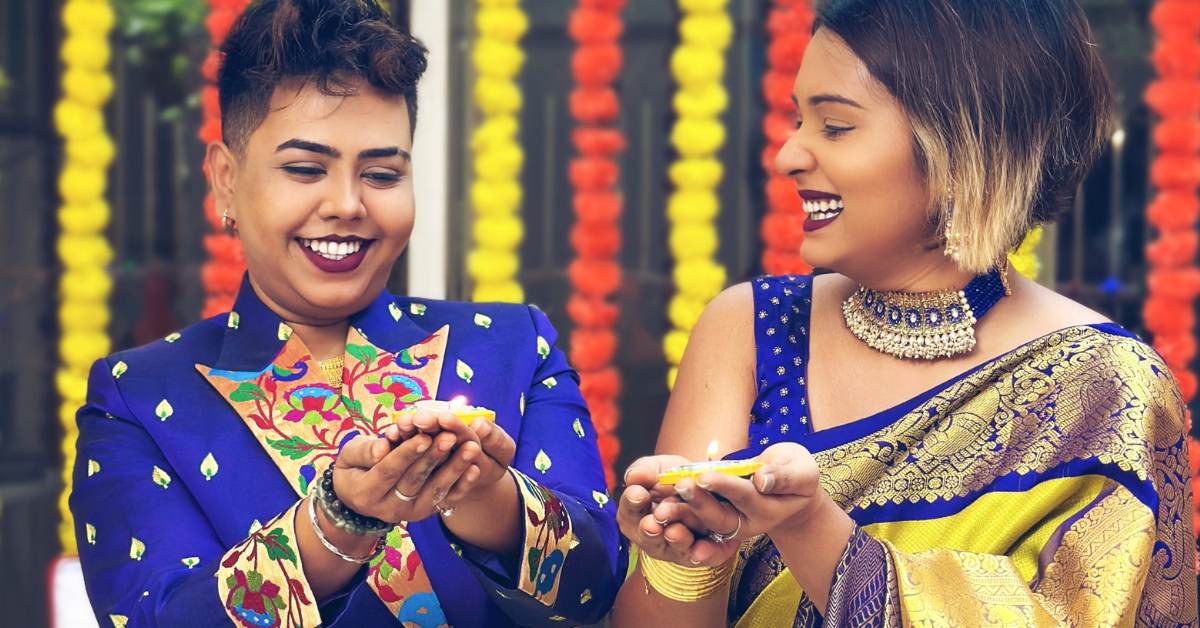 Sayantika and Nick shares a filmy romance where they grew from enemies to lovers
Sayantika and Nick shares a filmy romance where they grew from enemies to lovers
They describe themselves as a team in every sense. From navigating hate online to managing the challenges of being openly queer in a still-conservative society, they lean on each other. “There are tough days, of course,” Nick says. “But then one of us will say, ‘We are Team NiSa, we have got this’, and somehow, that is enough.” Their mantra becomes their armour in tough times. And it is not just the tough moments they weather together, but the tender ones too.
On weekends, Nick wakes up early and waits for Sayantika to rise, eventually nudging her awake like a bored child. “It is my favourite part of the day,” she says. “Seeing her wake up, grumpy and sleepy, but still reaching for me.” At night, when Sayantika finds it hard to sleep, something she has struggled with since childhood, she rests her head on Nick’s left arm and falls asleep as her partner gently tickles her hair. That arm, they joke, is now more of a pillow than a limb.
Home, in each other
Across the country in Mumbai, Atulan Purohit and Divesh Tolani live a life that is quieter in its narrative but equally vivid in love. They met in a contemporary dance company, where Atulan (28), who was a senior, initially paid little attention to Divesh (23). “I thought he was too young,” he says. But over time, their conversations developed, first through casual replies to Instagram stories, and then through more intentional time spent together. “We did not fall in love instantly,” Divesh says. “It was more like, one day I looked up and realised he was my favourite person to talk to.” There was no cinematic moment, no dramatic realisation. Their relationship grew like a subtle melody between dancers, in sync before they were even aware of it.
Now, six years later, they live together and co-create content under the name ‘Honey Imm Home’. Atulan works part-time as a fitness trainer for a New York-based fitness company, while Divesh works as an in-house marketing executive for an Indian company. Their lives are stitched together with the same familiar threads as any other couple, morning routines, tired evenings, debates over what to watch on television, and whose turn it is to do the dishes. “There is really no difference,” Divesh says. “People assume our life must be different because we are queer. But we come home tired, we argue, and we cuddle, just like any other couple.”
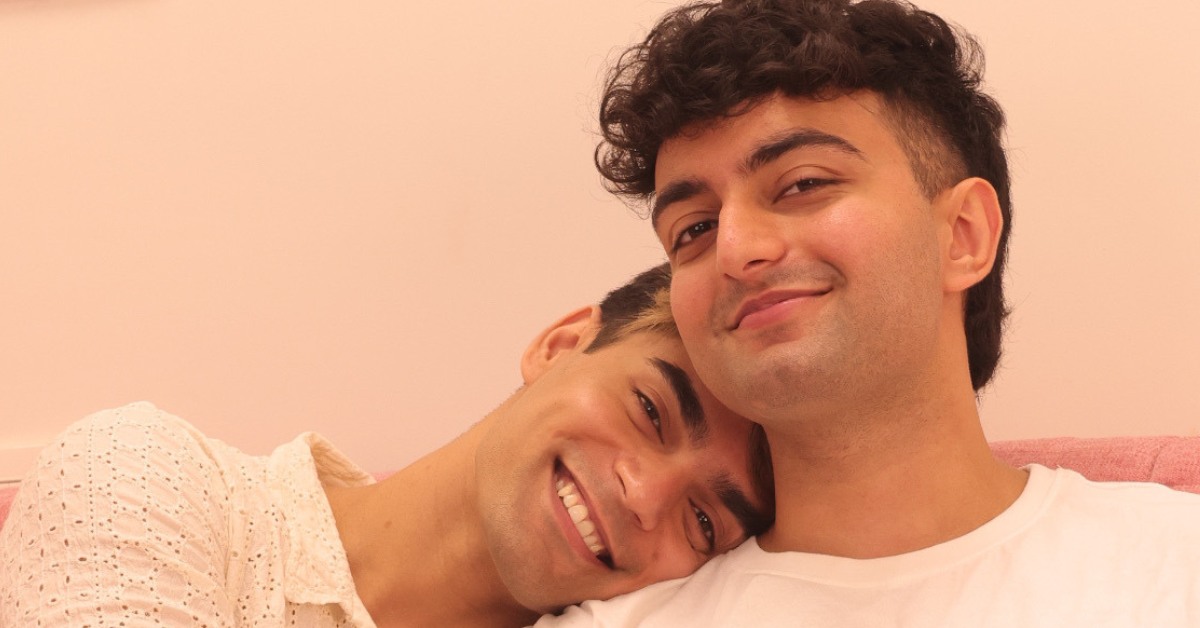 Atulan and Divesh met in a contemporary dance company for the first time
Atulan and Divesh met in a contemporary dance company for the first time
Still, there are moments when the world reminds them they are not like “any other couple” in the eyes of the law or society. Finding housing was a nightmare. Landlords asked inappropriate questions or simply stopped responding once they realised the truth. Booking a hotel room often means receiving two single beds by default, with a forced explanation at the reception desk that they are “just friends.” Holding hands in public is a small act of rebellion, filled with equal parts of joy and danger. “We have learnt to find humour in the absurd,” says Atulan. “Sometimes, it is the stares. Sometimes, it is the compliments. We do not let it change who we are.” “If we let every glare keep us inside, we would never step out,” Divesh says. “So instead, we choose to smile a little brighter.”
Nick and Sayantika echo that sentiment. Even though they work at the same office, where their colleagues are aware of their relationship, they are still perceived as two unmarried women. “People assume we are roommates,” Nick says. When they moved into their apartment, they had to pose as family friends, and even as sisters, to avoid landlord scrutiny.
 Through the years, Nick and Sayantika have been able to win the hearts of each other’s parents
Through the years, Nick and Sayantika have been able to win the hearts of each other’s parents
Nick now owns their rented flat, and because they cannot legally marry, it is not technically Sayantika’s home. “If we were a straight couple, one marriage certificate would make that my home too,” she points out. “But for now, I don’t even have an official address in Bengaluru.” “It is unfair, because emotionally, this is her home. Legally, it is just my name on paper,” Nick adds.
From ‘just a friend’ to family
Nick’s parents do not openly talk about her relationship with Sayantika, but their gestures speak volumes. They make a point of asking about Sayantika, include her in family confidences, and over time, their relationship has grown to be stronger and warmer. On the other hand, Sayantika’s family, especially her father, has embraced Nick not only with kindness but with active understanding. “My dad did his own research,” Sayantika shares proudly. “He now advocates for the community, which makes me feel safe.”
Nick reflects on the evolution within her own family. “I was not really out to them at first, but when Sayantika visited my home, met my parents, and even my extended family, everyone adored her. They treated her like my best friend. Now, it has come to a point where when I say I am visiting home, the very next question is why is Sayantika not coming too. Things have changed so much that they expect us to visit together,” she explains. It is proof of how love can gently reshape relationships, creating new bonds where once there might have been hesitation.
 Divesh and Atulan do not let the stares change who they are, they face everything together
Divesh and Atulan do not let the stares change who they are, they face everything together
Sayantika elaborates on the journey with her partner’s family, “We have since come out to her cousins and her brother, as well. I have a great relationship with her brother and cousins, along with their wives. We often hang out, and it is always fun. Five years ago, I was seen just as a friend. Now, I am family. That has been a phenomenal journey.”
Nick recalls her first visit to Sayantika’s family in Kolkata with a mix of affection and gratitude. “Her father cooked mutton for me, which was such a warm welcome,” she says. “We were attending a Bengali wedding, and I did not have a proper outfit for the occasion. Without hesitation, he brought out all his kurtas and insisted I wear one. It was such a simple gesture, but it meant the world to me.” For Nick, these moments stand out not just as acts of kindness but as signs of open-hearted acceptance. “Her parents have always been incredibly sweet,” she adds. “They talk openly about our relationship, which is something I have never taken for granted.”
Finding love that does not ask you to fit in
For both couples, that sense of safety, the comfort of being accepted and loved, is everything. It allows them to live authentically and fearlessly, and it inspires them to offer the same hope to younger queer people who are still searching for their place in the world. Sayantika wants others to know that queer joy is not a rare or fragile thing, it is plentiful and real. “Do not believe the tragic endings in films,” she says firmly. “With the right support, love is not a battle.
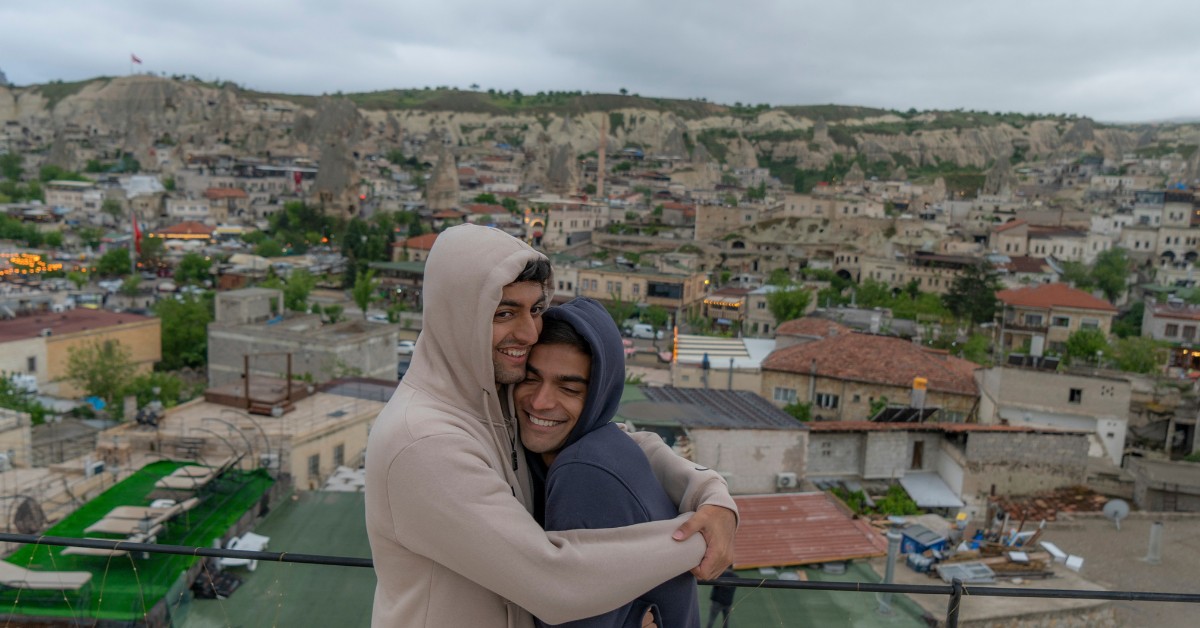 Atulan and Divesh believe that real love will always love you for who you are and not ask you to be a certain kind
Atulan and Divesh believe that real love will always love you for who you are and not ask you to be a certain kind
It is a gift that everyone deserves.” Nick adds another important thought: that love is not the sole measure of queerness or self-worth. “Even if you are single, even if a relationship ends, your identity is valid, so celebrate yourself. You are whole as you are. Love is wonderful, but it is not a requirement for worth,” she emphasises.
Atulan and Divesh carry that same message. Their relationship is not loud, but it is strong. It is in the way they mirror each other’s moods, support each other’s work, and find laughter in the everyday. “When he is anxious, I try to understand what he is going through and offer a comforting shoulder to rest on,” Divesh says. “That is how close we are.” It is in the shared skincare products, the impromptu dance routines, and the slow mornings. “We want queer youth to know that love should never feel like something you have to fight to deserve,” he adds. “Real love sees you. It does not ask you to shrink or be a certain kind,” explains Atulan.
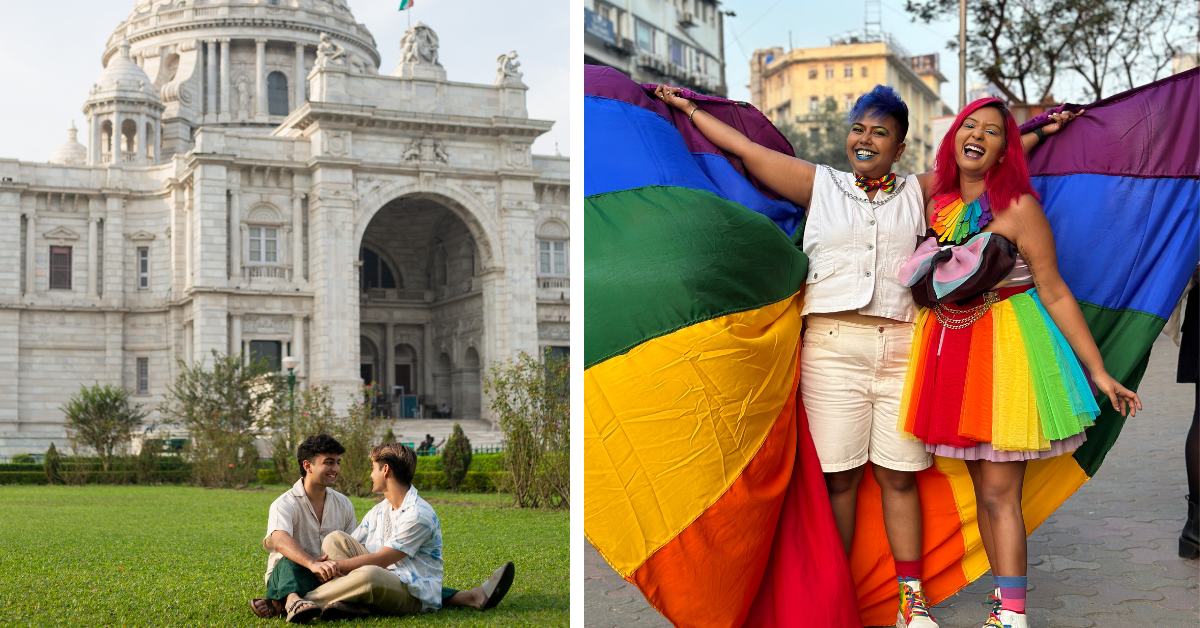 Both couples are writing their love stories with no templates and reimagining love
Both couples are writing their love stories with no templates and reimagining love
There is something powerful about love that does not conform to heteronormative expectations. In the small routines and the tender, everyday acts of care, Nick and Sayantika, Atulan and Divesh are creating space for a kind of love that has long been overlooked. It is not loud or confrontational, but it challenges norms simply by existing, by being soft, steady, and visible. They are building homes without blueprints and writing love stories with no templates, and in doing so, they are reimagining love.
To see more glimpses of their everyday love, follow @nick_and_sayantika and @honey.imm.home on Instagram
Edited by Leila Badyari; All pictures courtesy Sayantika and Divesh
News